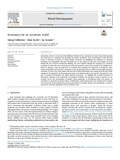| dc.contributor.author | DeMartino, George | |
| dc.contributor.author | Grabel, Ilene | |
| dc.contributor.author | Scoones, Ian | |
| dc.date.accessioned | 2023-10-19T16:00:45Z | |
| dc.date.available | 2023-10-19T16:00:45Z | |
| dc.date.issued | 2023-10-11 | |
| dc.identifier.citation | DeMartino, G.; Grabel, I. and Scoones, I. (2023) 'Economics for an Uncertain World', World Development, Volume 173, DOI:10.1016/j.worlddev.2023.106426 | en |
| dc.identifier.uri | https://opendocs.ids.ac.uk/opendocs/handle/20.500.12413/18149 | |
| dc.description.abstract | Uncertainty, where we do not know the likelihood of future events, dominates our world. This article examines how economics as a profession and discipline can address uncertainty. From Frank Knight to John Maynard Keynes to Friedrich von Hayek to George Shackle, economics has highlighted the importance of uncertain knowledge and distinguished this from calculable risk. In this article we show how such insights were lost through the rise of narrow neoclassical thinking and were excluded through the emergence of a dominant economics of control that rose to prominence during the twentieth century and especially in the neoliberal era. However, through a range of perspectives in economics that emphasise the importance of complexity, informality, positionality and narratives, uncertainty is once again being embraced within an increasingly heterodox economics. In many ways, this chimes with the work of Albert Hirschman who, starting from the mid-1960s, emphasised the importance of addressing uncertainty in development theory and practice. Through two examples on pastoral development and global financial governance, we highlight the continued relevance of Hirschman’s thinking on the importance of adaptation, flexibility and learning-by-doing as responses to uncertainty and for the development of reliable, robust approaches to development policy and practice. In conclusion, we argue that economics theory, methodologies, professional practice and training need to change, recovering some of the insights from previous generations of economic thinkers and practitioners, in order to reinvent an economics appropriate for our uncertain world. | en |
| dc.language.iso | en | en |
| dc.publisher | Elsevier | en |
| dc.relation.ispartofseries | World Development;173 | |
| dc.rights.uri | http://creativecommons.org/licenses/by/4.0/ | en |
| dc.subject | Economic Development | en |
| dc.subject | Finance | en |
| dc.title | Economics for an Uncertain World | en |
| dc.type | Article | en |
| dc.rights.holder | © 2023 The Authors. Published by Elsevier Ltd | en |
| dc.identifier.externaluri | https://www.sciencedirect.com/science/article/pii/S0305750X23002449 | en |
| dc.identifier.doi | 10.1016/j.worlddev.2023.106426 | |
| dcterms.dateAccepted | 2023-10-01 | |
| rioxxterms.funder | Default funder | en |
| rioxxterms.identifier.project | Default project | en |
| rioxxterms.version | VoR | en |
| rioxxterms.versionofrecord | 10.1016/j.worlddev.2023.106426 | en |
| rioxxterms.funder.project | e4b8632d-62dd-4f31-9936-43860ac26f9a | en |


